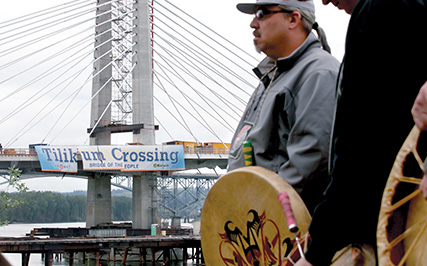Culture
Tribal effort leads to Native name for new Tri-Met bridge

PORTLAND -- When the Tri-Met Bridge Naming Committee unveiled Tilikum Crossing, the Bridge of the People, as the finalist from among hundreds of names nominated, it was a testament to a successful Grand Ronde effort to have a Native name selected for the transit bridge being built over the Willamette River.
On April 16, at the southwest corner of OMSI, along the Eastside Greenway Trail, more than 100 people gathered for the naming ceremony. There was a clear view of the bridge-in-progress through the clouds and mist of an overcast day.
The winning name came from Tribal Historian David Lewis and the Tribe's Language Program. Lewis also served on the nine-member Bridge Naming Committee.
Earlier, in 2013, Tribal Public Affairs Director Siobhan Taylor met with her Tri-Met counterpart.
"They were struggling with the dilemma that a lot of people wanted to have naming rights for the bridge," Taylor said. "That's when I suggested that a Tribal name be used. Give it a name that honors the original people of the Portland Basin. Name it for the people who make up today's Grand Ronde Tribe."
Taylor told Tri-Met officials that the Tribe would come up with a name that would represent the Tribe's ageless history in the area, but also "make it a name that would embrace all of the Portland metro community."
Taylor took the idea to Lewis, who consulted the Tribe's Language and Land and Culture staff. Together they came up with Tilikum, a Chinuk Wawa word for people, family or a gathering.
Historically, the word was spelled Tilixam, a Chinuk Wawa word that is difficult to pronounce.
"The 'x' sound has a slight sound almost like you are clearing your throat," said Kathy Cole, Cultural Outreach and Program manager and Chinuk Wawa instructor.
In the interest of giving the public a word that is easy to pronounce, the Tribe's proposal choose the word to Tilikum, Lewis said, one of a few different acceptable spellings.
In January, Tilikum Crossing joined Abigail Duniway, Cascadia Crossing and Wy'east as the final four names being considered. The public was invited to vote on their favorite.
The $135 million, 1,720-foot transit bridge coming to life over the Willamette River will connect Portland with Milwaukie for Tri-Met buses and light rail.
At the naming ceremony, Lewis described what the name means to the people of the Grand Ronde Tribe. A century and a half ago, he said, Grand Ronde ancestors were forced off their land and sent to reservations.
"It is an important time for us to re-establish our presence here in partnership with so many others," Lewis said. "Our people came from this place, but it's not simply a Native place. The bridge name means people, and it represents all people."
"This is really an acceptance and appreciation of our people," said Tribal Council member Cheryle A. Kennedy, who attended the naming ceremony. "It represents years of work and hope, and now it's here."
"To me, it's like another great day for the Tribe," said Tribal Council member Jon A. George. "Once again, we are having our footprint being recognized in our ceded lands."
"This is well-deserved and long-awaited recognition of the Tribe's presence in Portland," Taylor said. "We're the Portland Harbor Tribe, the Willamette Valley Treaty Tribe. The government of this Tribe has always had its hand out in friendship and partnership with other governments and agencies in our ceded lands."
"It was an historic naming process, very deliberate," said Sue Keil, a member of the Naming Committee and treasurer of the OMSI Board of Trustees.
Tri-Met General Manager Neil McFarland said that it was another step toward "full development" of the area.
Portland historian Chet Orloff, chair of the Tri-Met Naming Committee, said that the bridge name reflected "a shared sense of place. This is a bridge that will last."
At the "ta-da moment" in the ceremony when the name selected for the bridge was revealed, Tri-Met General Manager Neil McFarland said that "the bridge will announce its own name."
Martin Zarzar, a drummer formerly with the Portland band Pink Martini, started a drum roll, but nothing happened.
"You can't blame the banner for having a little stage fright," said McFarland. Then, a 150-foot banner unfurled and the name appeared: Tilikum Crossing, Bridge of the People.
Immediately, drumming from eight Tribal members could be heard. Moments later the group appeared with Native drums and the Tribe's traditional welcome song.
The drum group included Bobby Mercier, Jan Looking Wolf Reibach, Jordan Mercier, Brian Krehbiel, Reina Nelson, Cole, David Harrelson and George.
"After the announcement presentation and drumming, folks were coming up and congratulating us," said Reibach. "Several had tears in their eyes and expressed how happy they were to see the Tribe recognized in such a beautiful way."
The bridge is designed to carry light rail trains, streetcars, buses, cyclists and pedestrians, but no private vehicles.
"We think it is the first of its kind in the country," McFarland said.
The bridge is set for completion in September 2015. "It created 10,000 jobs when the region needed them most," McFarland said. "The project is on the way to creating 14,000 jobs before the bridge project is finished."
"In the past at this very place," said Orloff, "Native Americans took canoes back and forth across the river for celebrations, not unlike what we will do here."
The decision by the Naming Committee was unanimous.
"I didn't have to push very hard," Lewis said. "They understood our story in a deeper way than for the other names."
Tribal interpretive signs explaining the name and the lands the bridge connects are still to come. The Tribe will be on board for future events tied to the project, Taylor said.
